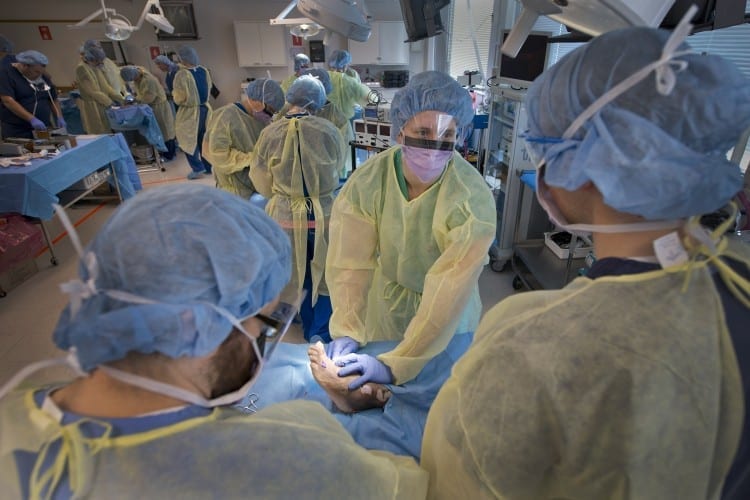After producing two research papers based on her work with 10 cadaravic limbs last fall, Mindi Feilmeier, D.P.M.’05, FACFAS, was contacted by representatives of the surgical instrument company Stryker. They proposed bringing in equipment for a session with her, podiatric medical residents and Paul Dayton, D.P.M., FACFAS, a podiatric physician with UnityPoint Clinic in Fort Dodge, IA , who became a part-time assistant professor in DMU’s College of Podiatric Medicine and Surgery (CPMS) in June.
Feilmeier suggested instead the session be offered to CPMS students on campus, using Stryker products and her cadaravic limbs.
“They had had minimal procedures done on them, so rather than waste them, we could create a hands-on opportunity for our students,” says the assistant professor. “It was a win-win.”
That was the first of three Saturday surgical workshops Feilmeier and Dayton have offered, each attended by up to 30 CPMS students. Participants first received a presentation on one or two surgical techniques, then divided into smaller groups and, guided by physicians and residents, practiced them in DMU’s surgical laboratory.
“The procedures we performed were ones I had read about and studied during the course of my education. Being able to actually perform the cuts, screw in the plates, drive the k-wires, etc., brought it all together,” says Colby Holmes, D.P.M.’15, who participated in all three workshops.
Classmate and workshop participant Grace Ouyang agrees: “It’s one thing to read and learn about procedures in class. It’s another to understand where to stand, how to approach the cuts and how to use your hands when you’re tightening a screw or affixing a plate. We learn from the physicians and residents. It’s a very comfortable environment in which to ask questions.”
In addition to Stryker, medical technology company Smith & Nephew and the Student Chapter of the American College of Foot and Ankle Surgeons (SCACFAS) have supported the workshops. Feilmeier says everyone understands the goal is enriched learning experiences for students, not product sales.
“When industry supports opportunities for students to learn and faculty to try new instruments, when done ethically and appropriately, it works very well,” she says. “We want to prepare students to interact with companies, not be swayed by glossy brochures and fancy dinners.
“We talk to students about being good stewards of health care dollars,” Feilmeier adds. “It’s all about good outcomes for patients.”
Feilmeier hopes to offer the workshops at least quarterly and possibly as continuing medical education sessions. She also sees opportunities for CPMS alumni and other local podiatric physicians to get involved as guides in the lab and to network with students, who are eager for the experience.
“Students love it, even though it means coming to campus for four hours on a Saturday morning,” she says. “During the first workshop, we were not really watching the time until I realized it was after 1 p.m. I think they would have stayed all day.”


